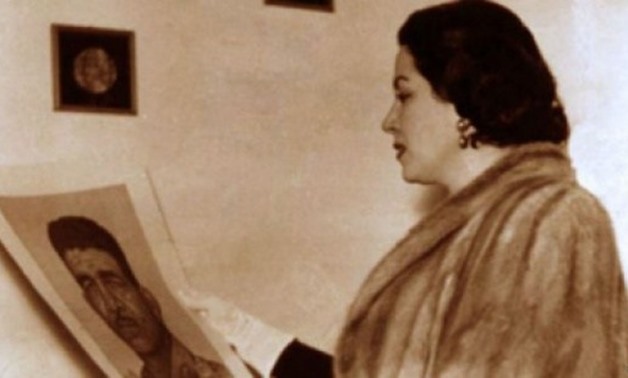
Leila Mourad watching President Muhammed Naguib 's photo - CC via Wikimedia Commons
CAIRO – 21 November 2017: In memory of legendary singer/actress Leila Mourad, the voice of the golden cinema age, Egypt Today sheds light on some of the highlights of her artistic and personal life, marking her 21st death anniversary.
Known for her innocent golden voice, full of emotions, Mourad would always grab attention when one heard her singing a symphony.
- She was born Jewish in Cairo on February 17, 1918 to a Syrian father, Zaki Mourad, and a Polish mother, Gamilah Salmon. Her father was a composer and singer who encouraged Leila to sing in radio in the 1930s. Being the eldest daughter, she later had to financially support her family.
- Her debut as a singer in the cinema was in “The Victims,” six years before starting her acting career with the “Long Live Love” film starring singer Mohamed Abdel Wahab, who also made her sign a contract for ten musical records. Director Mohamed Karim first said that she wouldn’t make a good actress due to her extremely small frame, but Abdel Wahab managed to convince him.
- Producer, director, scriptwriter and actor Togo Mizraahy gave her true fame through seven films, including “Leila Bent El-Reef” (Laila From the Countryside), “Leila Bent Madares” (Laila: The School Student), and “Leila”. Out of 28 films of her career, 17 carried her real name.
- Her film “Ghazl El Banat” (The Flirtation of Girls) is until today one of the most important films in the history of the Egyptian cinema. She costarred with legendary actors Naguib El-Rihany, and Youssef Wahby, who had introduced the film idea to Mourad.
- Her unforgettable role in “Qalby Daleeli” (My Heart is My Guide) film with Anwar Wagdy and the song carrying the same name has maintained wide fame for generations. The song is still featured in modern films, including the late director Mohamed Khan’s “Fi Shaqet Masr El Gedida”( In Heliopolis’ Apartment ), who believed that “her voice is a unique classic.”
- The romantic film was a successful end for her acting journey that lasted for 15 years. She insisted on retiring in 1955, until Egyptian composer Baleegh Hamdi convinced her to host a TV program in the 1960s on Abu Dhabi TV.
- She declared her Islam in 1947, one year after she sang “Ya Hoggag El-Beit” (Oh Pilgrims) and “Ya Sett Nazra” (Lady Zeinab, Look at Me).
One day in Ramadan, she woke up to the voice of “Adhan” (Islamic call for worship) near her home at 26 Sherif Street, in Downtown Cairo. As she felt an inner peace to listen to it keenly bringing up her spiritual inspiration, she asked her husband actor Anwar Wagdy why he did not ask her to convert to Islam, telling him that she wanted to embrace Islam immediately.
- In response to a rumor published in a Syrian magazine accusing Leila of being a spy who donated EGP 50,000 to Israel, Egypt and most Arab countries boycotted her artistic performances for some time.
- While in Europe, she asked for protection from President Mohamed Naguib; she then sang her last national song “Union, Organization, and Work” (Bel Itihad, W El-Nezam, W El-Amal) then retired from her artistic career as a way to thank him.

Comments
Leave a Comment